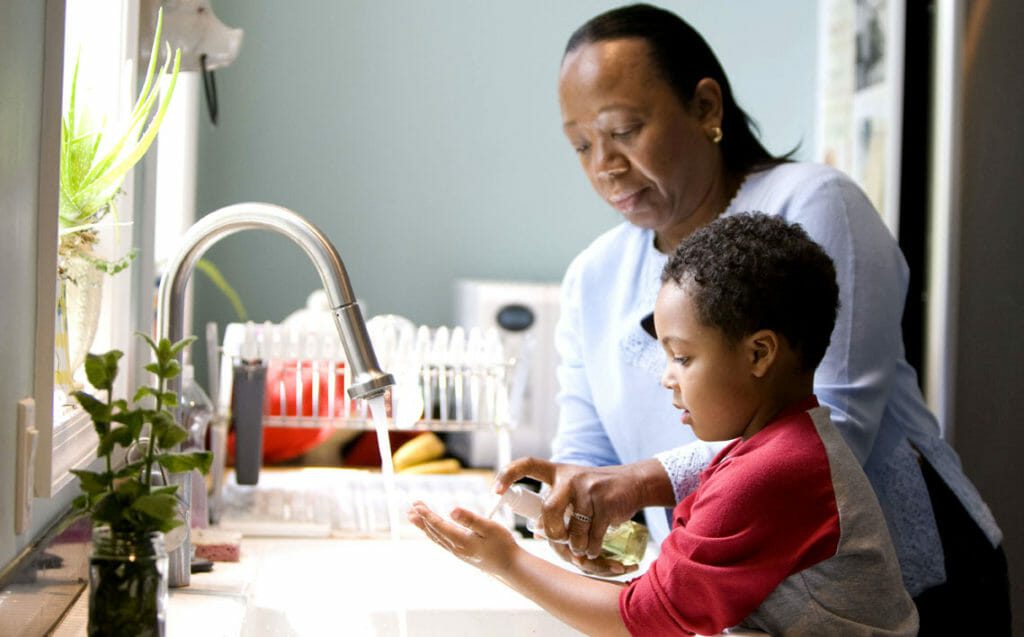By Aaron Lavallee, Deputy Assistant Administrator, Office of Public Affairs and Consumer Education, USDA FSIS, and Laura Scott, Public Affairs Specialist, USDA FSIS
A research team supported by the U.S. Department of Agriculture’s (USDA) Food Safety and Inspection Service (FSIS) is conducting five separate iterations of a meal preparation study to address a specific consumer behavior and to determine the effectiveness of a behavior change intervention.
These meal preparation experiments are part of a five-year study that also includes focus groups (two iterations) and web surveys (two iterations).
A lack of basic food safety practices and proper handwashing during meal preparation was revealed in the first three years of the five-year observational study conducted by FSIS.

The study looked at improving food safety messages by evaluating food handling in a test kitchen. From the findings, FSIS has targeted its messaging to address the proper steps of handwashing, cleaning, and sanitizing to reduce the risks of cross-contamination.
Study goals include learning:
- How are people getting food safety information?
- Are we delivering the right messages?
- What are people doing during meal preparation?
As part of both the year-one and year-three studies, participants sat in a waiting room and viewed a newsfeed on a monitor. The test group newsfeed included a food safety story. The year-two study test group received food safety messages in their scheduling emails.
Each study addressed specific consumer behavior and assessed the effectiveness of a related behavior change intervention. Thus far, studies have looked at the adequacy of cleaning and sanitizing activities, poultry washing, and handwashing attempts.
- Year one: Using a thermometer on turkey burgers and hand washing.
- FSIS observed the food handling behaviors of consumers preparing turkey burgers and a side salad.
- Unsafe food handling behaviors led to germs from raw poultry spreading in the kitchen.
- Year two: Washing poultry.
- FSIS observed the kitchen behaviors of consumers who self-reported washing poultry while they prepared chicken thighs and a side salad.
- Participants did not attempt to clean the sink immediately after washing or rinsing poultry.
- Year three: Using a thermometer on not ready-to-eat (NRTE) frozen poultry.
- USDA observed the kitchen behaviors of participants preparing NRTE frozen stuffed chicken breasts and frozen corn products.
- Participants did not properly wash their hands before handling NRTE frozen chicken.
During all three years, the observation study showed that participants did not practice proper handwashing steps. Before and during meal preparation, the participants either did not wash their hands or did not wash them sufficiently ― about 95 to 99% of the time.
Handwashing was insufficient because participants:
- Did not use soap (2% control & treatment)
- Did not scrub hands with soap and water for at least 20 seconds (93% control to 90% treatment).
- Did not wet hands with water before applying soap (63% control & treatment)
- Did not dry hands with a clean or one-use towel. (2% control to 5% treatment)
Using the observational research findings, FSIS created safe food handling messaging on proper handwashing, cleaning and sanitizing, and cross-contamination such as:
- Shifting the messaging from “do not wash poultry” to explaining that washing poultry can spread germs around the kitchen and cross-contaminate other foods.
- A 2019 social media campaign about poultry washing that ran from August to December.
- FSIS produced and shared eight videos highlighting study results in 17 social media posts.
- FSIS worked with the Centers for Disease Control and Prevention (CDC) to create educational infographics and videos to encourage successful handwashing.
The FSIS contracted with RTI International (RTI) and its subcontractor, North Carolina State University (NCSU), to conduct this survey. In addition to the observational studies, focus groups and web-based surveys are part of the five-year study.
UPCOMING PRESENTATION
Thursday, March 11
2:10 to 2:30 p.m. EST
During the conference, FSIS will present a deeper dive into the results of the first three years of the observational research. The results thus far are helping to develop more effective messaging. For example, preventing cross-contamination by properly cleaning and sanitizing kitchen surfaces is now being promoted instead of “do not wash your poultry.” The FSIS contracted with RTI International (RTI) and its subcontractor, North Carolina State University (NCSU) to conduct this study.
ABOUT THE CONFERENCE
The 2021 Consumer Food Safety Education Virtual Conference, March 9-12, 2021, sponsored by the non-profit Partnership for Food Safety Education, is the only conference in the U.S. dedicated to consumer food safety education. For more conference information and to register, please visit fightbac.org/virtual.